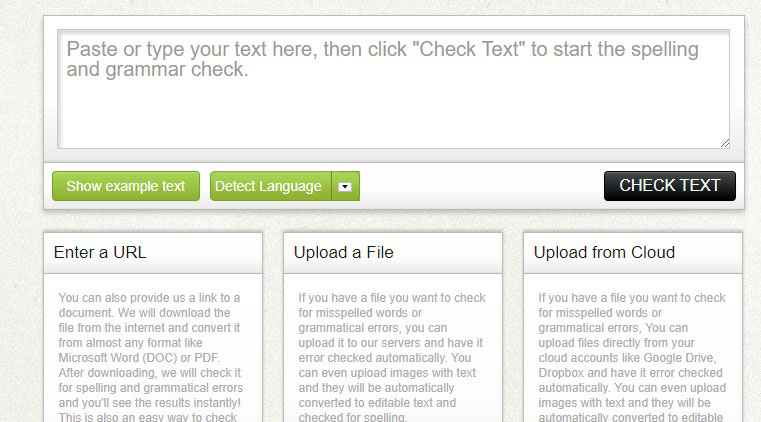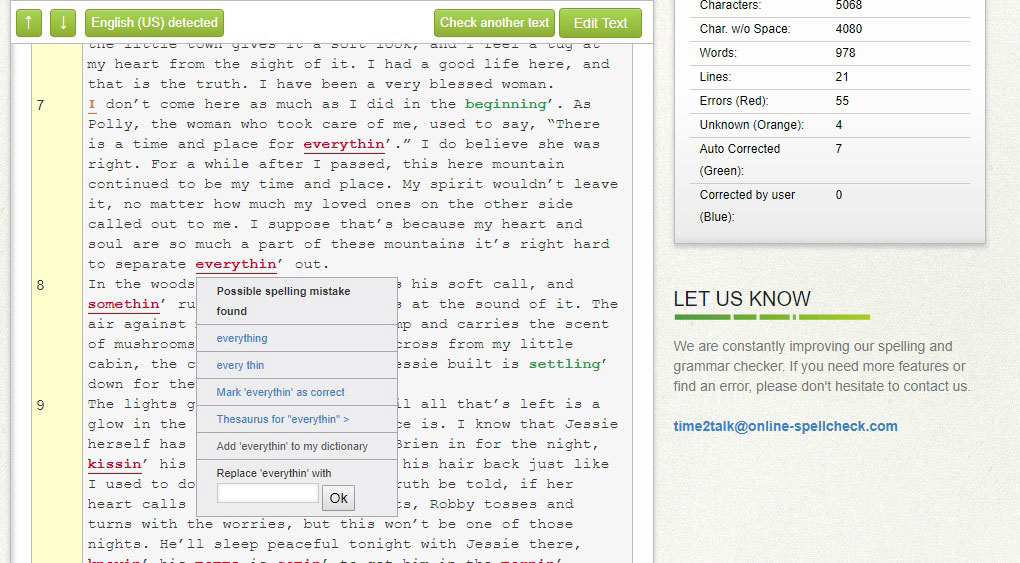 Indies Unlimited has an entire resource section dedicated to free resources for authors including pictures, music, sound effects, fonts, cover makers, and more.
Indies Unlimited has an entire resource section dedicated to free resources for authors including pictures, music, sound effects, fonts, cover makers, and more.
Now I’m back with even more free resources for authors. Instead of free photos and music, these resources are designed to help with grammar and mechanics.
Grammarly is probably one of the most well-known grammar checkers, and it has both free and paid options. I attempted to install the free Microsoft Office ad-in to play around with for this post, but after having issues signing in, I uninstalled it to try again some other day. In the meantime, check out the ones below.
How many times have you heard that authors should write in active voice as opposed to passive voice? Does Microsoft Word ever give you a squiggly blue line telling you you’ve written something in passive voice? Let’s be clear: sometimes, passive voice is the best fit. But more often, active voice is the way to go.
Active voice, which has the subject performing the action, tends to be stronger than passive voice. For example, “At breakfast, toast and fruit were eaten by me” is passive voice. It sounds a little wimpy. “I ate toast and fruit for breakfast” is active voice. It sounds much stronger.
If you’re still confused, you can paste a passage into this free online Passive Voice Detector to be sure you’re using active voice. If you’re not, the passive section will be highlighted with an explanation.
Unsure which pronoun to use? Did she and I go to the store, or did her and me?
Online-Spellcheck checks spelling, grammar, contextual misspellings (such as there or their), and commonly switched words (such as rain or rein).
According to the FAQs (always read the FAQs!), this online service is completely free and there’s no word limit to what you can upload. You can paste text into a box, enter a URL, upload a file, or upload from the cloud.
 I uploaded a short story of mine to see what happened. I uploaded this specific one deliberately because it contains Gaelic, dropped “gs,” and other regional dialect. This is what Online-Spellcheck produced:
I uploaded a short story of mine to see what happened. I uploaded this specific one deliberately because it contains Gaelic, dropped “gs,” and other regional dialect. This is what Online-Spellcheck produced:
 If you click on one of the flagged words, you’ll get a list of suggestions. Pretty impressive, right? You can then choose to download a copy, email a copy, print a copy, or save a copy. However, a word of warning: You have to manually delete your submission; it isn’t done automatically unless you open an account. See my screenshot below:
If you click on one of the flagged words, you’ll get a list of suggestions. Pretty impressive, right? You can then choose to download a copy, email a copy, print a copy, or save a copy. However, a word of warning: You have to manually delete your submission; it isn’t done automatically unless you open an account. See my screenshot below:
 There are several more online grammar-check sites, but this was one of my favorites, both because it’s quite thorough, and because there’s no length/word limit to what you can upload. With this site or any other, always be sure to read the terms of service before using.
There are several more online grammar-check sites, but this was one of my favorites, both because it’s quite thorough, and because there’s no length/word limit to what you can upload. With this site or any other, always be sure to read the terms of service before using.
Next, do you have trouble knowing which words in a title should be capitalized? Paste/type it into Capitalize My Title and you’ll see it displayed correctly according to APA, Chicago, AP, and MLA guidelines.
And finally, just for fun, are you having trouble coming up with a name for one of your characters? Name Generator can help. Just answer the questions and voila — a list of names.
I’ll be back with more resources in the future, and possibly to include a demonstration of Grammarly’s free version — if it doesn’t annoy me again.
What free tools have you discovered on your writing journey? Feel free to tell us about them in the comments.
[Note from the Admin: Please don’t forget, online tools don’t take the place of a real, live editor. ? ]

Thank you, Melinda. Now if I could only find a comma checker!
I love commas! I always have to go back and delete half of them. Having said that, this might help: https://www.grammarly.com/blog/comma/
I have been using grammar for the last six months. It points out where you need a comma or not, double wors, and sentence fragments. However, it is fixated on past tense, and it has gender issues and plurality issues sometime. Also it insists on pointing out that the word mankind is sexist not appropriate and that humanity is a better word to use. Also if you use a pronoun more than once in a sentence or paragraph it points it out it does not know who you are talking about. You can select ignore but when you close then reopen your document, it still points out as errors the things you do not want to change and wanted to ignore. It does help me with basic grammar. However, I am not sure if I will continue to use it or find something better.
[Note from the Admin: Please don’t forget, online tools don’t take the place of a real, live editor. ? ]
Exactly.
To Greta Burroughs: commas are a movable feast (sorry for the cliche …).
I used to use commas a lot. Nearly 50 years ago when I was a young newspaper sub-editor I was working on the day’s court copy.
To fill a hole in the page I took a short item and rewrote it. How clever. Such initiative.
Not so clever a week later when the editor received a letter from a lawyer complaining that his client, the complainant, had been turned into the defendant – and the defendant into the complainant.
It was down to two commas that were unnecessary.
It cost the paper a couple of thousand dollars and an apology. The editor was benevolent. I wasn’t fired.
For the next 40 years or so I was especially particular about my commas.
Then while I was writing my first novel, in 2013, I found that I was being distracted by commas (passive construction there, that sentence, but I didn’t like the active).
I realised that I didn’t need a lot of them so I went back and dropped perhaps most of them. By doing that I found sentences became easier to read and more energetic because the words were having to do the work they should have been doing all along.
I haven’t ditched them entirely. I keep them for non-defining clauses, date clauses (e.g., Tuesday, August 28, 2018, which it is here in New Zealand), always before the word ‘too’ because it indicates a pause, and a handful of other instances. See that Oxford comma there?
I edit for a friend, too. He wrote his first book in 1990. I went back and looked at my editing of it compared with the four he’s written since 2013.
The difference was stark. In 1990 his 6 x 9 page looked cluttered. These days they’ve mostly been eliminated. The pages look cleaner. He, I, and readers agree that his books now read better.
Greta, I think a lot of it comes down to ‘feel’. You’re the writer. Sometimes ‘feel’ has to take precedence over the grammar rules.
Cheers
– Paul Corrigan
Good stuff. Thanks.
Thanks, Yvonne!
This post was written several weeks ago, and since then I’ve gotten used to Grammarly. Like you indicated, though, it flags a lot of things I don’t want flagged.
JB, this was in response to you, but my replies are acting wonky today!
I’m really enjoying Grammarly, as it applies to my WordPress sites, and anything that slips through when I write a post in Word shows up as an error when I’m uploading it. It just picked up two errors as I was writing this comment.
Which I promptly fixed, so that doesn’t make a very graphic example
However, I hope now there will be no more panicky emails to Kat saying “I left an error in my comment; please fix it!”
LOL, I’ve had to email Kat, too.
Thanks, Melinda! I need all the grammar help I can get. I’m sure poor BigAl feels like it’s pushing a rock uphill.
Thanks for stopping by! (Now let’s see if this comment goes where it’s supposed to!)
Good information, Melinda. But what in the heck is Linda talking about? (She tests me.)
Great resources, and fun, too! Thanks!
I must check out grammarly.
Thanks for stopping by, everyone. Since writing the post, I’ve installed Grammarly and used it quite a few times. I plan on writing a tutorial sometime in the future.
Hi there, great post! I prefer ProWriter to Grammarly (both paid versions) as I think the former has helped me improve my writing.
Thank you, Emma – I’ll have to take a look at ProWriter. That’s a new one to me.
I *think* Gordon may have written about that tool, but I can’t recall the name of it. Sorry!
Good info – thanks, Melinda!
For those who write fantasy, I ran across an online fantasy name generator the other day. Here’s the URL: https://www.fantasynamegenerators.com
Thanks, Lynne!